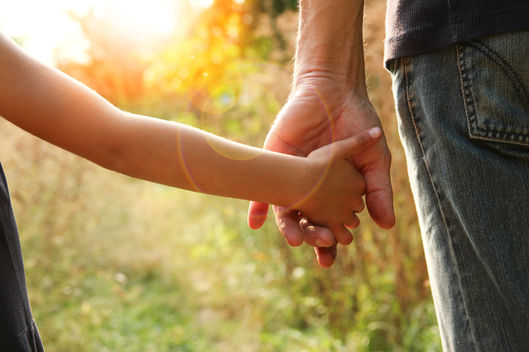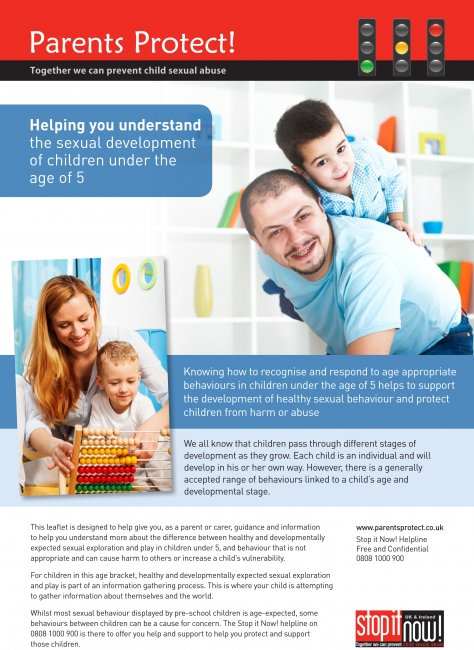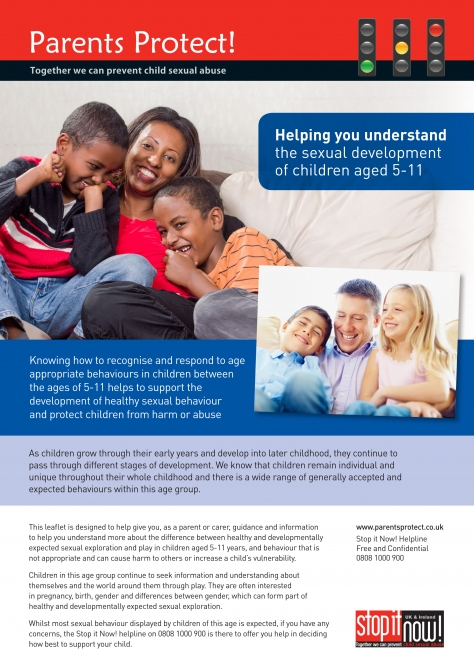Contents
- Preventing harmful sexual behaviour in childhood and adolescence
- A toolkit that help prevent harmful sexual behaviour.
- Talking to children and young people about harmful sexual behaviour
- 0 - 5 years old
- 6 - 10 years old
- 11 - 16 years old
- Children and young people in the online world
- Leaflets to download
Preventing Harmful Sexual Behaviour in childhood and adolescence
As with any behaviours, children and young people need guidance and support to follow a positive path. This will involve developing healthy attitudes to sex and relationships and learning to live healthy, harm free lives. We need to protect young people from both experiencing and carrying out sexual harm.
Rather than only focusing on harmful sexual behaviours after they occur, early steps in prevention of harm and the promotion of healthy attitudes and behaviours around sex is crucial.
One of the first things we can do from an early age with children is to talk to them in positive, open ways about what is ok and not ok. Children need to learn what behaviours are harmful and why. Much like violent or aggressive behaviours, children need guidance around sexual behaviours. Parents can find sex tricky to talk to children about. In order to prevent harm we need to promote healthy and appropriate behaviours.
A toolkit that help prevent harmful sexual behaviour.
The toolkit is suitable for parents, carers and professionals working with children.
As well as support, advice and information, it has links to key organisations and helplines, resources about harmful sexual behaviour by children, tips about internet safety, advice about sexual development and preventing child sexual abuse.
Talking to children and young people about Harmful Sexual Behaviour
How we talk to children and young people about sex and relationships can be influenced by our own beliefs and experiences. However, it is important to consider what crucial messages we want to give children about sex. Increasingly, children are growing up in an online world. Social media, pornography and modern culture means that children are increasingly aware of sex, often from an early age. Some of the messages they receive are not always helpful in terms of healthy development so we need to ensure that we help children to develop knowledge that will enable them to acquire healthy and appropriate attitudes around sex and relationships. This has an important role in protecting them from experiencing harm and also from harming others.
How and what we teach children needs to be guided by their age and development needs. It is important to have open communication with children throughout their development to raise their awareness of their bodies, of their rights, to help them develop positive attitudes, awareness of consent, perspective taking, awareness of healthy sexual behaviours and how to keep safe.
Here are some tips for talking to children and young people:
0 - 5 years old
Keeping information simple and chats short but frequent.
Using books and online resources to help shape conversations (see 'Parents Protect' for a useful list of books available).
Develop awareness of their bodies and the correct language for body parts.
Teaching them that private parts are private and they/others have the right to privacy and they have the right to say no to anyone wanting to see/touch them.
That sometimes there are reasons for an adult to look at or touch their body, like a doctor or nurse.
That we don’t keep secrets about our bodies. Secrets can be about surprises and presents.
Encouraging them to speak up if anything happens they are uncomfortable with.
Starting to teach them about consent – not hugging, kissing, touching other people if they don’t want it.
Teaching perspective taking, how others feel.
Promoting healthy attitudes - love is love and it is ok to love boys or girls.
Role modelling positive relationships and attitudes.
Answer questions, encourage communication.
Resources in the Talking to your child under 12 section may be useful.
6 - 10 years old
Encourage open communication and an environment where they feel they can ask questions, or discuss any worries they may have.
Teaching appropriate words for body parts.
Answering queries about where babies come from in a factual way.
That bodies come in all different shapes and sizes.
That touching our bodies can feel good but is not something to be done in public/with others.
That bodies change as they get older and the importance of body hygiene.
Explaining sex in a way that helps them see it as not only for making babies, but a normal part of adult life.
Start discussions about friendship, love, dating and promote positivity about different types of relationships.
Teaching about consent – that doing things that others don’t want to do is not ok.
That anything that makes us feel uncomfortable or unsafe is not ok.
That it is important to speak up if something doesn’t feel ok.
That people make mistakes with relationships and sex, but it is important to do things only that feel ok and that the other person is ok with.
Start teaching about keeping safe online, dangers of chat-rooms, online bullying, that sending/sharing naked pictures is not ok.
Start to talk about why some things are not ok – they are against the rules, make people feel upset, hurt, cause harm.
11 - 16 years old
Open communication about sex, love, relationships by creating an environment that encourages questions.
Further detailed information about sex, reproduction and safe sex.
Learning about puberty – what happens to the body, emotional changes, differences between boys and girls.
Promoting the importance of acceptance, respect for others, no matter what stage of puberty, what gender, what sexual orientation. .
That being curious about sex is normal, how puberty influences this.
Teaching about masturbation as normal, but a private activity.
That accessing pornography is common for teenagers but it is important to help them understand that not all porn is ok, that porn may not reflect real relationships and that if they view things they feel uncomfortable with stop viewing and seek support.
Further detailed focus on online safety, particularly the dangers on online chat-rooms, people may not be who they say they are.
That naked pictures of under 18’s are not ok and why this is.
About consent, persuasion, coercion – that it is not ok to engage others in sexual activity or chat that they are not fully willing to.
That it is not ok for other people to force, pressure or persuade them to engage in sexual chat/activity.
Discuss what influences the ability to consent and thinking about how they can be sure that they have full consent.
That they should speak up if something happens they are uncomfortable with.
Reinforcing the idea that young people can act in inappropriate and sexually abusive ways, as can adults. That laws around sexual offending apply to adults as well as young people.
Using opportunities such as talking about scenes in TV programmes, the news, or things that have happened in school to explore relevant themes in a relaxed way’
Children and young people in the online world
If you are worried about your child’s online activities, view Children and young people in the online world which provides resources on how a child can navigate the online world in a safe way.
Leaflets to download
These leaflets are from our Parents Protect website.
They will provide further information to help you to understand more about the difference between healthy and developmentally expected sexual exploration and play in children and young people, and behaviour that is not appropriate and can cause harm to others or increase a child's vulnerability.
Did you know?
Stop It Now! Scotland can provide you with confidential advice. Just call 0808 1000 900
Source - Stop It Now! Scotland
Read more








